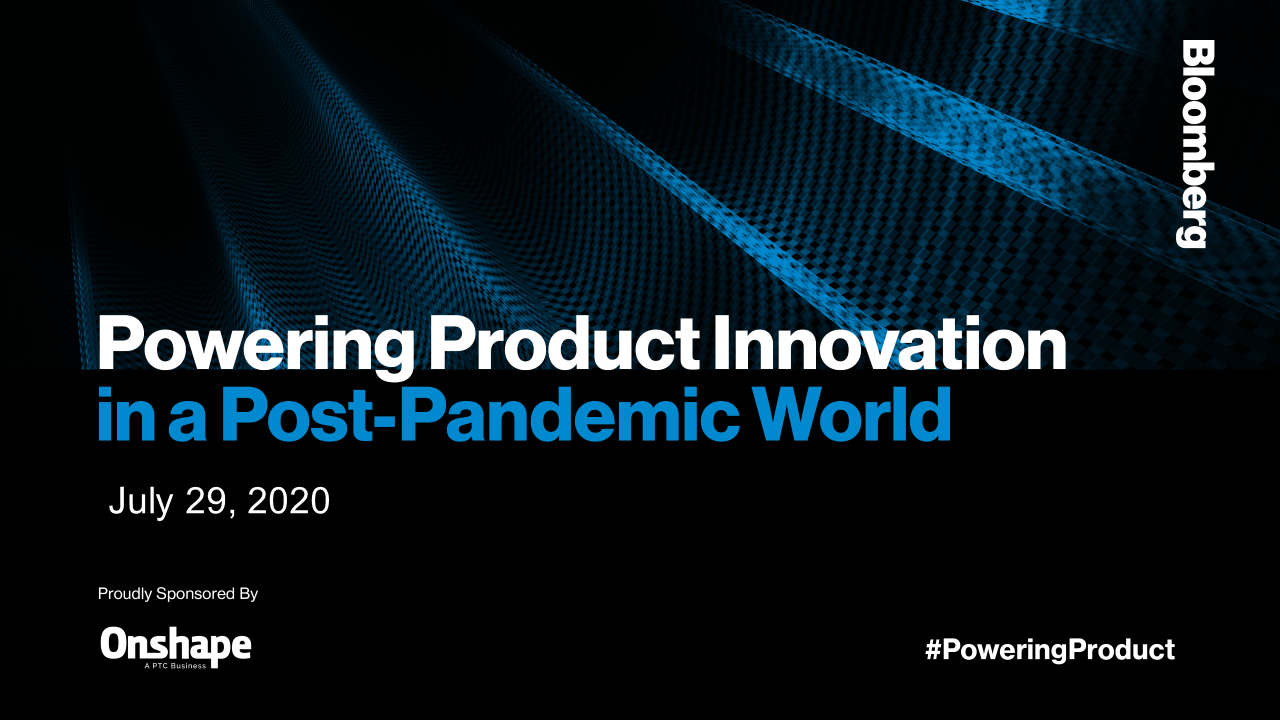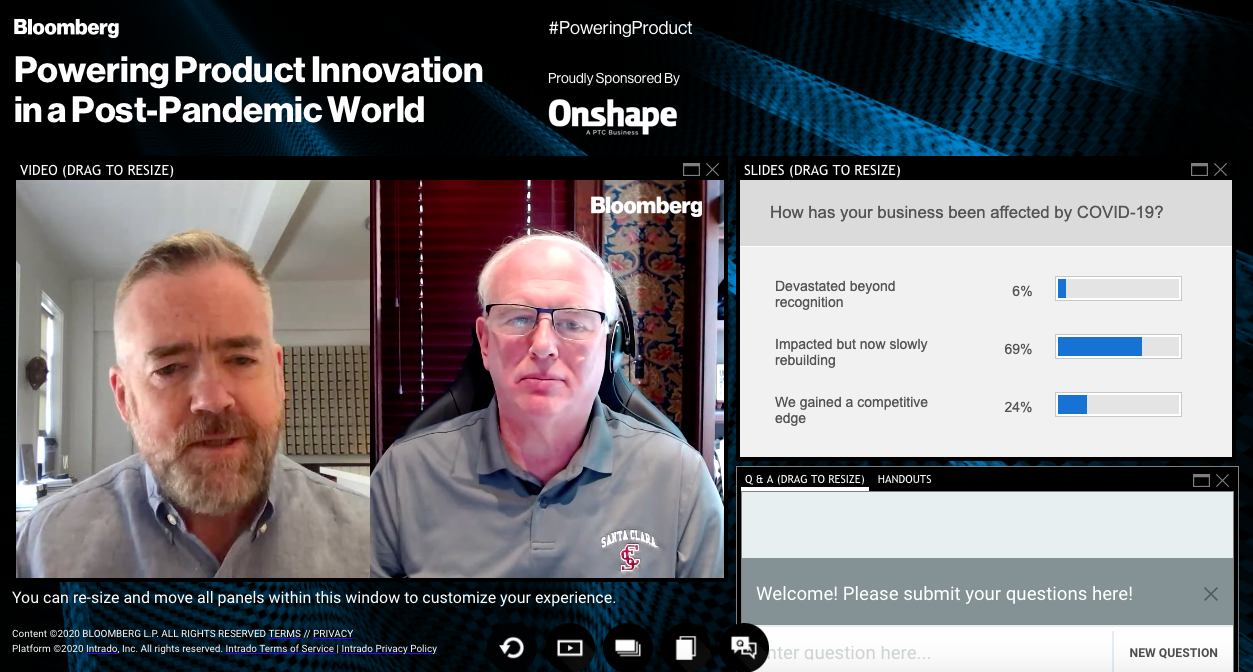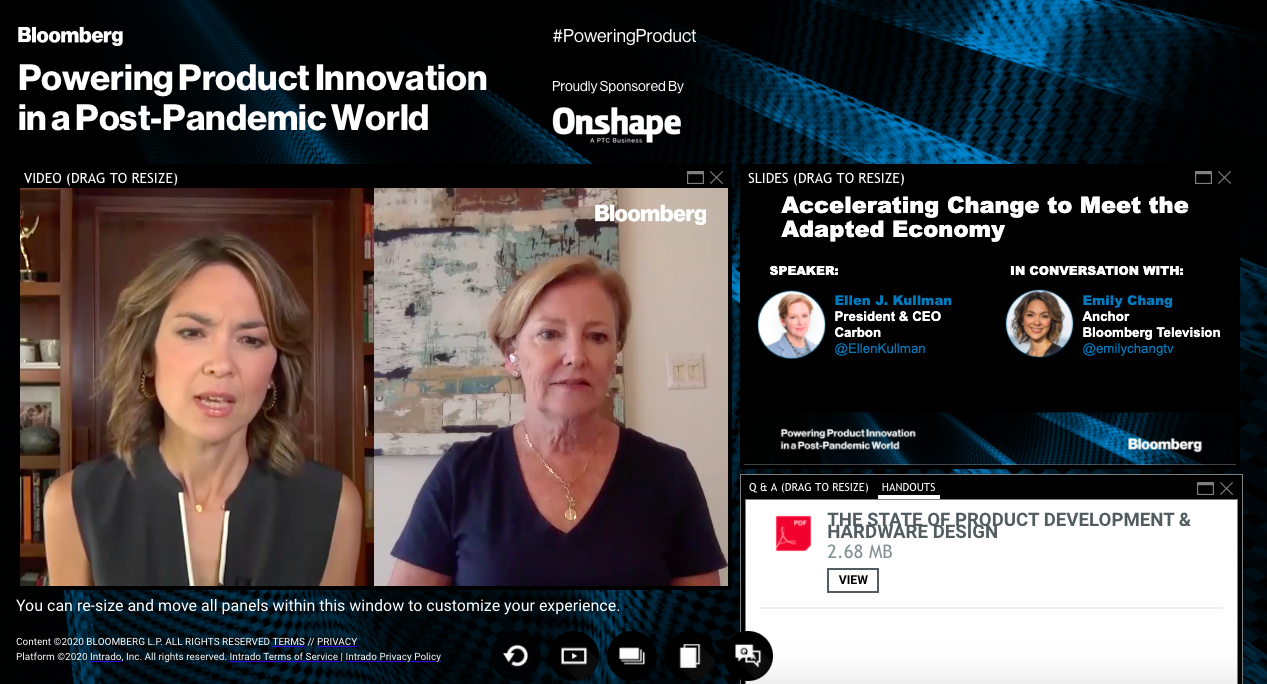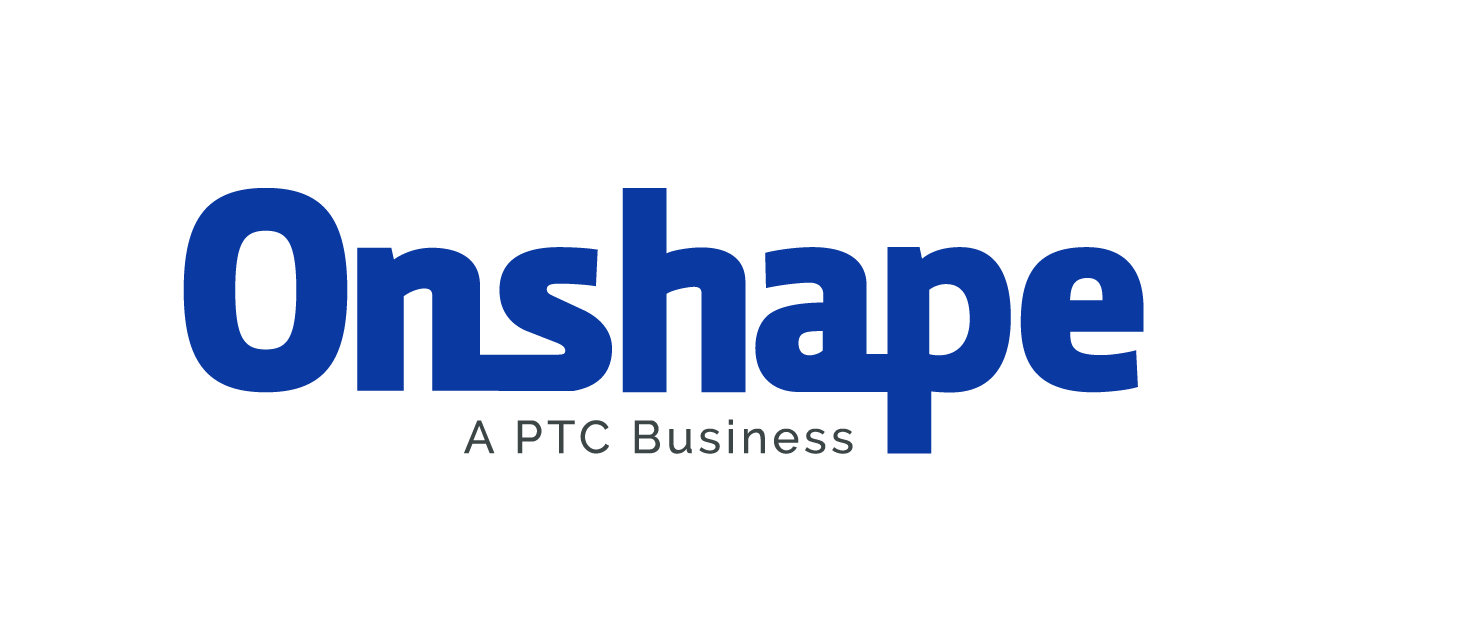By Ed Stapley, Bloomberg Live
At Bloomberg’s July 29 virtual event, Powering Product Innovation in a Post-Pandemic World, a series of conversations took place with key voices and leaders in the global manufacturing and innovation space. These sessions were led by Bloomberg’s Mark Miller and Emily Chang. Speakers included:
- Omer Bar-Yohay, CEO and Co-Founder, Eviation Aircraft
- Jon Hirschtick, President of SaaS business, PTC; Founder of Onshape and Solidworks
- Thomas Ingenlath, CEO, Polestar; Chief Design Officer, Volvo Car Group
- Ellen J. Kullman, President & Chief Executive Officer, Carbon
- Emily Chang, Anchor, Bloomberg Television
- Mark Miller, Global Editor, Bloomberg Live
Click here to view video of the full discussion.

A few of the key takeaways:
- Thomas Ingenlath, CEO, Polestar; Chief Design Officer, Volvo Car Group, said that the pandemic has made businesses realize that “you can manage things you thought would be impossible to do.” Polestar 2, the first all-electric car from Polestar, is due to be launched this year — the company had to build its whole supply chain up again. “We had to completely rethink the launch of the car,” Ingenlath said. “We had to decentralize and activate local teams to do what we would have done centrally.” Despite the disruption caused by Covid-19, Ingenlath feels that the changes that have been brought about vindicated the company’s original business model. “We started out wanting to embrace electrification and e-commerce directly to customers online,” Ingenlath said. Everything that was questioned about this business model before, especially around customers not physically interacting with the brand, Ingenlath says is suddenly not questioned anymore. “It has now become essential for the traditional car industry to adapt and pick up these ideas really quickly and execute them for themselves,” Ingenlath concluded.
- Omer Bar-Yohay, CEO and Co-Founder, Eviation Aircraft — a company that is producing the world’s first all-electric commuter aircraft — said that the pandemic doesn’t really change their long-term plan. “In the medium and long term, we ask the fundamental question: Do people need a sustainable aircraft at their regional distance capability? The answer is absolutely yes, maybe even more so after Covid,” Bar-Yohay said. When it comes to building the aircraft and thinking about the supply chain, manufacturing, and contacting partners and customers, Bar-Yohay feels that “there are things that felt avant-garde 2 minutes ago that today seem really normal.” Bar-Yohay believes that the pandemic sharpened a lot of existing trends, especially with regards to remote and distributed operations such as designing and working in the cloud. Due to the global resources required to make Eviation’s project a technical success, the company decided to design the entire aircraft in the cloud from the beginning. “This was perceived as a bit weird at the time, but today this trend of working from a distance has dramatically shifted and became much more real and common, and some of it will be taken into the future,” said Bar-Yohay.

- Jon Hirschtick, President of SaaS business, PTC; Founder of Onshape and Solidworks, remarked on both headwinds and tailwinds resulting from Covid-19. “On the negative side we sell to the world’s product developers and manufacturers and many of them are going through horrible times and working hard to rebuild,” Hirschtick said. “On the other hand, the market is suddenly realizing the value of a full-cloud, full-SaaS solution and the advantages it gives to remote and distributed work, to agility and to innovation, and we think that trend is here to stay.” Hirschtick added that companies are realizing that no matter what is round the next corner it’s going to be something they didn’t expect and, therefore, they are putting a big premium on their ability to rethink and be agile. “What is going to be constant is a realization that there are no constants,” he said.

- Ellen J. Kullman, President & Chief Executive Officer, Carbon, had to shut down all manufacturing and laboratories within a 12-hour period in mid-March. With permission to produce medical equipment, very quickly the company started thinking about the power of their nearly one thousand 3D printers to help alleviate some of the shortages resulting from the pandemic. “First thing we produced was face shields and within a week we had customers printing them — over 350,000 have been produced for communities in need,” Kullman said. Carbon also designed a nasopharyngeal swab to help alleviate the testing supplies shortages; this work provided employees with a purpose and made them rally round how they could help reduce some of the pandemic-caused shortages, she said. Kullman, the first woman to have led DuPont in its 212 year history, believes that women are especially well placed to lead countries and companies in times of difficulty. Having conferred with her peers, she believes this is “based on our resilience, on our ability to handle ambiguity — and these are times when uncertainty is raging,” she said.
Powering Product Innovation in a Post-Pandemic World was Proudly Sponsored By

——————————
Join the Conversation: #PoweringProduct
Instagram: @BloombergLive
LinkedIn: Bloomberg Live
Twitter: @BloombergLive
Interested in more Bloomberg Live virtual events? Sign up here to get alerts.
——————————